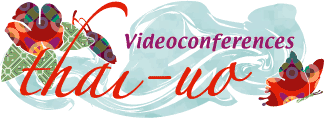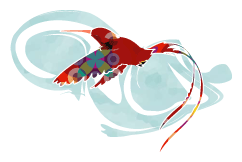Part 1: Project-Based Learning, Session 5
 |
||
 |
Documents |
|
Handouts and Resources Lecture Guide for Session 5 Slides for Session 5 |
Videos |
|
Online access to the videoconference lecture requires a broadband (DSL, cable, ethernet, etc.) Internet connection. The lecture is freely available below in Windows Media Player, RealPlayer and QuickTime formats for both Windows and Macintosh computers. Session 5, Windows Media Session 5, RealPlayer Session 5, QuickTime |
Session 5 – February 17, 2005
Project Evaluation and Thai Demonstrations
Leslie Opp-Beckman, University of Oregon
Linguistics Department, American English Institute
Email: leslieob@uoregon.edu or use the Contact web page.
About the Speaker
Leslie Opp-Beckman is a Senior Instructor in the MA Language Teaching Specialization program for the Linguistics Department at the University of Oregon. She also develops online training, teaches courses, and acts as Technology Coordinator for the American English Institute.
Overview
This is the fifth session in 2005-06 in the 10-part professional development series for English as a Foreign Language (EFL) educators in Thailand. It is the final session on Project-Based Learning. University of Oregon is partnering with the US Embassy in Bangkok, the Royal Thai Distance Learning Foundation, the Ministry of Education, colleagues at Chulalongkorn University, and at ThaiTESOL on this innovative and exciting project.
Review: Discussion Questions
- Session 5 includes some practice with formative and peer feedback. How does formative review differ from summative review? Who are the main people involved in a peer review? (See Session 3 for a review on assessment, as needed.)
- Session 5 includes some demonstrations of projects from teachers who participated in this series. Which projects did you think were most effective? Were there any you would like to try with your own students. Explain your answer.
- How Does PBL Work?
Project-based learning, as with all lessons, requires much preparation and planning. It begins with an idea and an “essential question.” In the busy schedule of the school day, there is often little time for reflection. Yet, reflection is a very important part of the learning process. How do we expect our students to be able to synthesize their new knowledge if they are not given time to reflect upon what they have discovered? Too often, we teachers do not allow ourselves the time to reflect, as well.
Question: What else does this site say about the PBL process and about assessment and reflection? What are your personal views and classroom practices on reflection? - David A. Kolb on Experiential Learning
David A. Kolb’s model of experiential learning can be found in many discussions of the theory and practice of adult education, informal education and lifelong learning. This site–from infed–explains the model, and analyzes its strengths and weaknesses.
Question: The experiential framework is a cycle: participate or experience > reflect > form concepts > put into practice. In terms of this series and your experience with project-based learning, what did you experience? Where are you in the cycle? What did you find most useful? What else do you want to investigate further? What are your future plans?
Online Teacher Resources
Following are some additional resources as a follow up to the 5 sessions on project-based learning.
- Getting a Grip on Project-Based Learning: Theory, Cases and Recommendations
An article by Michael M. Grant, published in the Meridian journal. - Project-Based Learning on the Net
A list of example projects from other schools and educators. - Virtual Schoolhouse
What is PBL? The framework for creating successful projects consists of six elements: academic rigor, authenticity, applied learning, active exploration, adult connections and assessment practices.
What do the Projects Look Like?
Seeing is believing. In this section you can sort and review all of the projects on the site and access information on the history, evolution, outcomes, and lessons learned of twelve exemplary projects. Throughout this section, are samples of student work in audio and still images that capture the breadth, depth, and power of students’ efforts.